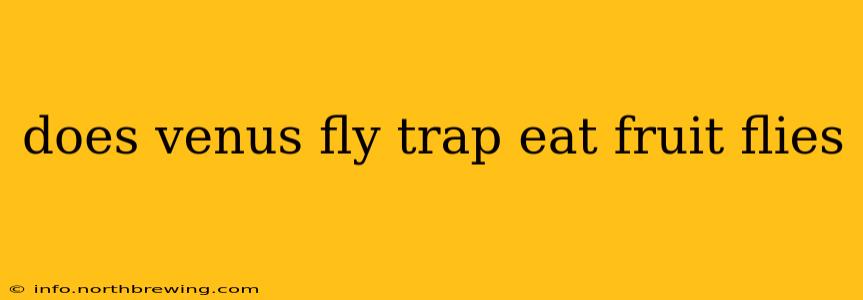Does a Venus Flytrap Eat Fruit Flies?
The question of whether a Venus flytrap eats fruit flies is a common one among carnivorous plant enthusiasts. The short answer is: yes, but with caveats. While Venus flytraps are perfectly capable of catching and digesting fruit flies, they're not their ideal prey, and success depends on several factors. Let's delve into the details.
What Do Venus Flytraps Eat?
Venus flytraps are fascinating carnivorous plants that primarily thrive on small insects. Their preferred diet consists of crawling insects like:
- Ants: These are often a significant part of a Venus flytrap's diet in the wild.
- Spiders: Small spiders can easily trigger the trap and become a meal.
- Beetles: Certain beetles are large enough to trigger the trap but small enough to be consumed.
Fruit flies, being relatively small and light, present a unique challenge.
Why Fruit Flies Aren't the Perfect Prey
While a Venus flytrap can catch a fruit fly, there are several reasons why they're not optimal prey:
-
Weight and Triggering the Trap: Fruit flies are lightweight. The trap's sensitive trigger hairs need to be stimulated twice within a short period to snap shut. A single fruit fly landing on the trap might not provide sufficient weight or movement to trigger this mechanism reliably.
-
Escape: Fruit flies are agile fliers. Once trapped, a fruit fly might be able to escape before the trap fully closes, or it might be small enough to slip through the gaps.
-
Nutritional Value: While any insect provides some nutrients, larger insects typically offer a more substantial nutritional boost to the plant. Fruit flies are relatively small, meaning the nutritional return on the energy expended by the trap might not be efficient.
How to Feed a Venus Flytrap Fruit Flies (and Should You?)
It's possible to feed a Venus flytrap fruit flies, but it's generally not recommended. Here's why:
- Inefficient Hunting: The success rate of catching fruit flies is low, leading to wasted energy for the plant.
- Focus on Ideal Prey: It's more efficient and beneficial to provide the plant with its preferred food sources: ants, spiders, or small beetles.
- Risk of Rot: Dead, decaying fruit flies can introduce harmful bacteria or fungi to the trap, potentially causing rot and damage.
If you're determined to try, consider gently placing the fruit fly on the trap's trigger hairs. However, manage expectations – the trap might not close, and even if it does, the fly might escape.
What Happens If a Venus Flytrap Does Catch a Fruit Fly?
If, by chance, a Venus flytrap successfully traps and digests a fruit fly, it will absorb some nutrients from the insect. The process of digestion will take several days to a week, after which the trap will reopen.
What Other Insects Can Venus Flytraps Eat?
Besides ants, spiders, and beetles, Venus flytraps can also consume other small insects such as:
- Grasshoppers (small nymphs): Again, only smaller versions are suitable.
- Crickets (small): Similar to grasshoppers, only smaller crickets should be fed.
- Caterpillars (small): Small caterpillars can be a suitable meal.
In conclusion, while a Venus flytrap can technically eat a fruit fly, it’s not an ideal food source. Focusing on providing insects more suited to its trapping mechanism will ensure the health and well-being of your carnivorous plant.
